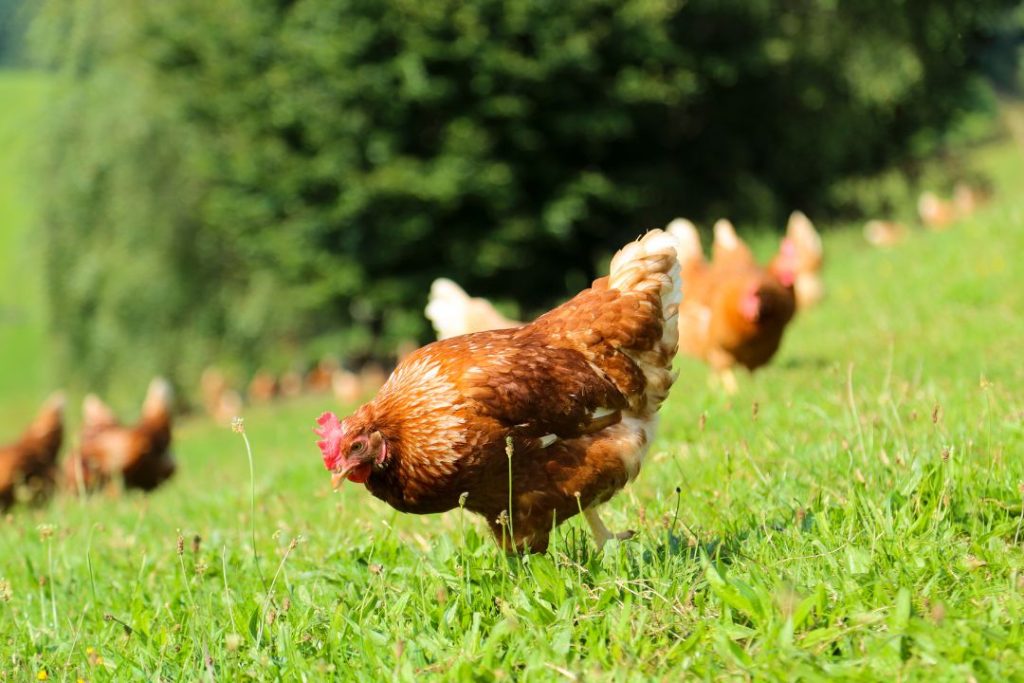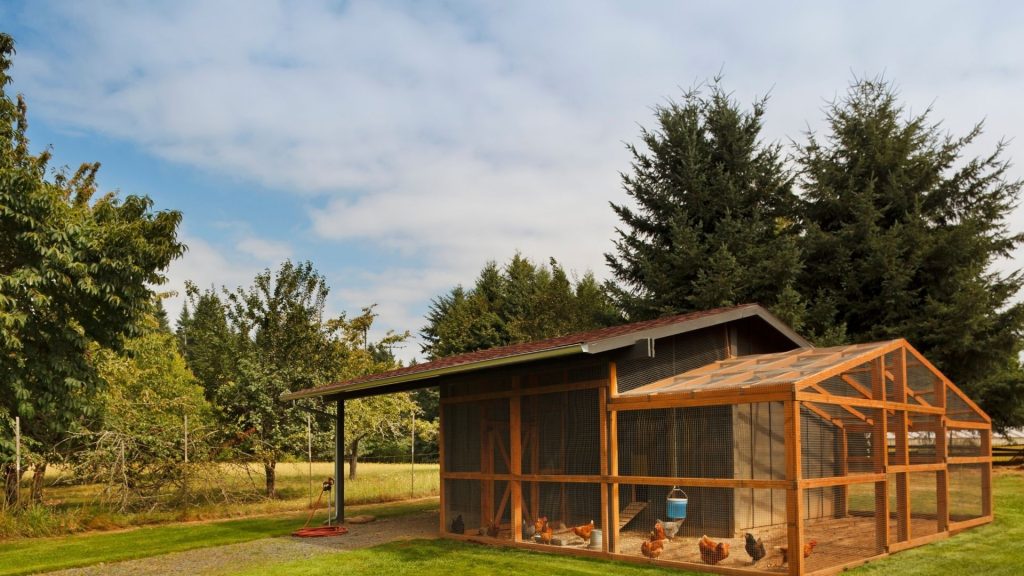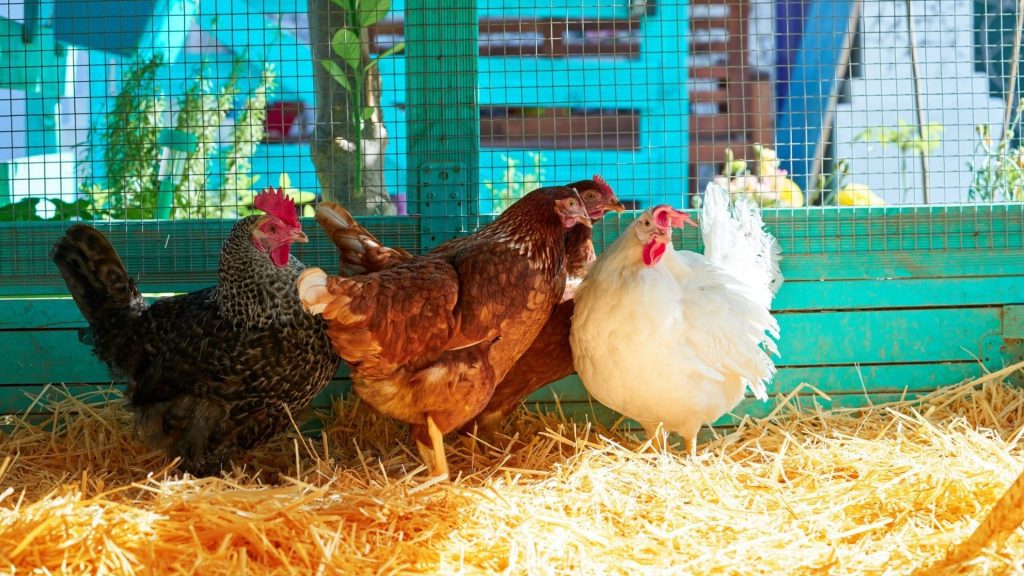Have you ever found yourself in the unpleasant situation of cleaning up chicken poop from your grass? Whether you’re a backyard chicken keeper or a professional farmer, dealing with chicken waste is a common challenge.
In commercial poultry farming, poop management is crucial. Efficient cleaning methods are employed. The goal is to maintain hygiene and prevent diseases. However, through manual method or using water and soap you can clean up the chicken poop from grass.
In this guide, we’ll explore how to clean up chicken poop from grass using effective strategies and preventive measures. From understanding the nature of chicken poop to employing the right tools and techniques, we’ve got you covered. Let’s dive in!
What is Chicken Poop Made Of?
Chicken poop consists of digested food, bacteria, and waste materials. Knowing its composition helps in selecting the right cleaning method.
Chicken waste is a complex substance. Its primary components are digested food, bacteria, and waste materials. Various food particles contribute to its makeup. Grains, seeds, and insects are common in a chicken’s diet. These elements are broken down in the digestive system.
Bacteria play a vital role in digestion. They help break down food in the chicken’s gut. Waste materials are the byproducts of digestion. Together, these elements form the chicken’s faeces.
The colour of chicken poop varies. Diet and health can affect its appearance. Greenish shades may indicate a grass-rich diet. Darker colours suggest more grains and seeds. Consistency also varies with diet. Watery stools may signal health issues.
Understanding chicken poop’s composition is essential. It aids in selecting the right cleaning method. Different cleaning agents target different components. For digested food particles, mild detergents work well. Bacteria may require specialized cleaning solutions.
Farmers often analyze chicken poop. It can reveal insights into the chicken’s health. Nutritional deficiencies may be detected through examination. Proper care and diet adjustments can be made accordingly.
Chicken waste has other uses too. Composting turns it into valuable fertilizer. The process neutralizes harmful pathogens. Gardeners appreciate its nutrient-rich qualities.
Why is Cleaning Chicken Poop Important?
The importance of cleaning chicken poop transcends mere cleanliness. Cleaning chicken poop is essential for maintaining hygiene and preventing diseases.
1. Hygiene Maintenance
For chickens, a clean environment means fewer health issues. Their feathers remain pristine, and their living conditions become more comfortable. For humans, a yard free of chicken waste is visually appealing and ensures that the space is sanitary for other activities.
2. Disease Prevention
Ensuring regular cleanup diminishes the risk of such infections. Moreover, chickens can contract diseases like Coccidiosis from their faeces. Regular removal of poop reduces the chances of such outbreaks.
3. Odour Control
Nobody enjoys the pungent smell of chicken waste, primarily due to ammonia. Over time, this can be harmful to the chickens’ respiratory systems. For humans, the odour can be a significant nuisance. Cleaning up the waste ensures a fresher, more breathable atmosphere.
4. Pest Control
Flies, rodents, and other pests are attracted to chicken waste. These pests are not just annoyances; they can carry and transmit various diseases. By cleaning up chicken poop, you disrupt their habitat and breeding grounds, reducing their numbers.
5. Lawn and Garden Health
While chicken faeces can act as a fertilizer in small amounts, an excess can harm plants. Grass can get burnt patches from the high nitrogen content. Regular cleaning ensures that lawns remain green and gardens flourish without the risk of damage.
6. Composting Opportunities
Chicken waste is an excellent addition to compost piles. When composted correctly, it breaks into a nutrient-rich mixture perfect for gardens. This process manages waste and provides an organic solution for plant growth.
7. Regulatory Compliance
In many regions, there are strict regulations about animal waste disposal to protect community health. Regular cleaning and proper disposal methods ensure you comply with local laws, avoiding potential fines.
8. Enhanced Egg Quality
A clean environment directly impacts the quality of eggs produced. Eggs from clean surroundings have fewer contaminants, ensuring they are safer for consumption. Such eggs often have better taste and appearance, making them preferable to consumers.
9. Improved Chicken Health
A clean environment reduces stress in chickens. When less stressed, chickens are generally healthier, have stronger immune systems, and produce eggs more consistently.
10. Water Protection
Rain and water can wash away chicken poop into nearby water sources, leading to contamination. This can harm aquatic life and even affect human water supplies. Regular cleaning ensures that water sources remain uncontaminated.
11. Neighbour Relations
A yard filled with chicken waste can lead to disputes with neighbours, especially if the smell travels or flies become a common nuisance. Maintaining a clean yard fosters a harmonious relationship with those living nearby.
12. Economic Considerations
For farmers, there’s an economic angle to consider. Healthier chickens, free from diseases, are more productive and fetch better prices in the market. Preventing disease through cleanliness is more cost-effective than treating an outbreak.
13. Aesthetic Appeal
Beyond the practical reasons, a clean yard simply looks better. It’s a space you can be proud of, and it might even positively impact property values.
14. Educational Opportunities
For families with children, cleaning can be an educational chore. It teaches them responsibility, offers insights into biology, and if you’re composting, it provides lessons on sustainability and environmental care.
How to Clean Up Chicken Poop From Grass?
Chicken enthusiasts, we understand the struggle. Keeping a lawn free from chicken droppings can be a daily battle. But fear not! We have two proven strategies to help you win the war against those pesky poops.
Manual Removal – A Time-Honored Tradition
Now below, go through the details of the manual removal of chicken poop.
Tools Needed
- Shovel: A sturdy shovel is your main weapon. Choose one with a comfortable grip to make scooping easier.
- Gloves: Safety first! Good gloves will protect your hands from germs and keep them clean.
- Bucket: You’ll need somewhere to put the poop. A bucket with a handle will make transportation a breeze.
Step-by-Step Guide
- Identify the Affected Areas: Walk around your yard. Look closely at the grass. Find those hidden droppings.
- Use a Shovel: Approach each spot with care. Gently slide the shovel underneath. Lift without harming the grass.
- Dispose of Properly: Place each scoop in the bucket. When full, follow local guidelines for waste disposal. Clean your tools afterwards.
Manual removal is about precision and care. It’s a method that respects your lawn while effectively removing waste.
Using Water and Soap – A Gentle Alternative
Water and soap might be the answer if you’re looking for a less labor-intensive method. This gentle approach is especially useful for softer or more spread-out droppings.
Tools Needed
- Hose: A garden hose with adjustable pressure settings will give you control over the water flow.
- Mild detergent: Choose a biodegradable, lawn-friendly detergent. It’ll break down the poop without harming your grass.
Step-by-Step Guide
- Prepare a Soap Solution: Mix water with the detergent in a bucket. Stir until well combined.
- Spray the Affected Areas: Target the droppings with the hose. Spray the soap solution generously. Let it soak for a few minutes.
- Rinse Thoroughly: Use clean water to rinse the area. Make sure to remove all soap residue. Inspect your work to ensure cleanliness.
Water and soap offer a gentle cleaning experience. They work together to dissolve the waste, leaving your grass unharmed.
Preventive Measures
Prevention is better than cure, especially when managing chicken poop on your lawn. Let’s explore two key strategies that can make a significant difference.
Designing a Chicken Run – A Controlled Environment for Happy Chickens
A chicken run is more than just a fenced area. It’s a thoughtfully designed space that allows chickens to roam while keeping their droppings contained.
- Understanding the Need for a Chicken Run: Chickens love to explore. They scratch, peck, and wander. A chicken run keeps them safe. Your lawn stays cleaner.
- Choosing the Right Location: Location matters. Consider sunlight and shade. Think about drainage. Proximity to the coop is essential.
- Selecting the Right Materials: Quality materials last longer. Choose durable fencing. Consider the height. Chickens can jump surprisingly high.
- Size Considerations: Space is vital for happy chickens. Provide enough room. Consider the number of chickens. Avoid overcrowding.
- Adding Enrichment: Chickens need stimulation. Add perches and toys. Provide dust baths. Happy chickens are healthy chickens.
- Maintenance of the Chicken Run: Regular cleaning is key. Inspect the fencing often. Repair any damage promptly. Maintain a pleasant environment.
Regular Cleaning Schedule – Consistency is Key
A regular cleaning schedule is like a magic wand. It keeps everything in order and ensures that small messes don’t become big problems.
- Understanding the Importance of Regular Cleaning: Regular cleaning prevents buildup. Odors are controlled. Diseases are kept at bay. Your yard looks great.
- Creating a Cleaning Schedule: A schedule brings consistency. Create a cleaning schedule and clean daily, weekly, or bi-weekly. Stick to the cleaning routine perfectly.
- Tools and Supplies: Have the right tools ready. Shovels, hoses, and buckets are essential. Store them conveniently.
- Involving the Family: Cleaning can be a family affair. Teach children responsibility. Make it fun. Time together is valuable.
- Seasonal Considerations: Weather affects cleaning. Adjust your schedule as needed. Winter may require less frequent cleaning. Summer might need more.
- Record Keeping: Keep a cleaning log. Note what you’ve done. Track any issues. Stay organized.
Frequently Asked Questions
How Often Should I Clean Chicken Poop from Grass?
It’s advisable to clean chicken poop daily or at least weekly to prevent odour and potential health risks.
Can I Use Chicken Poop as Fertilizer?
Chicken poop can be used as fertilizer, but it must be composted first to kill harmful pathogens.
Final Note
Managing chicken poop on your own doesn’t have to be a constant struggle. You can take control of the situation by implementing preventive measures like designing a chicken run and establishing a regular cleaning schedule.



